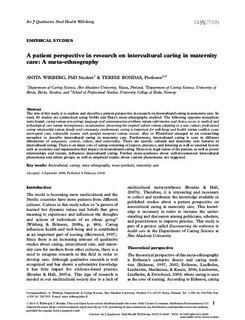A patient perspective in research on intercultural caring in maternity care : A meta-ethnography
Journal article, Peer reviewed

Åpne
Permanent lenke
http://hdl.handle.net/11250/293115Utgivelsesdato
2010Metadata
Vis full innførselSamlinger
Originalversjon
Wikberg, A. & Bondas, T. (2010). A patient perspective in research on intercultural caring in maternity care: A meta-ethnography. International Journal of Qualitative Studies on Health and Well-being, 5(1) : 4648. doi: 10.3402/qhw.v5i1.4648Sammendrag
The aim of this study is to explore and describe a patient perspective in research on intercultural caring in maternity care. In total, 40 studies are synthesized using Noblit and Hare’s meta-ethnography method. The following opposite metaphors were found: caring versus non-caring; language and communication problems versus information and choice; access to medical and technological care versus incompetence; acculturation: preserving the original culture versus adapting to a new culture; professional caring relationship versus family and community involvement; caring is important for well-being and health versus conflicts cause interrupted care; vulnerable women with painful memories versus racism. Alice in Wonderland emerged as an overarching metaphor to describe intercultural caring in maternity care. Furthermore, intercultural caring is seen in different dimensions of uniqueness, context, culture, and universality. There are specific cultural and maternity care features in intercultural caring. There is an inner core of caring consisting of respect, presence, and listening as well as external factors such as economy and organization that impact on intercultural caring. Moreover, legal status of the patient, as well as power relationships and racism, influences intercultural caring. Further meta-syntheses about well-documented intercultural phenomena and ethnic groups, as well as empirical studies about current phenomena, are suggested.
